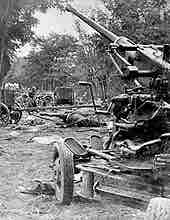As Europe moved closer and closer to war in the late 1930s, the United States Congress was doing everything it could to prevent it. Between 1936 and 1937, much to the dismay of the pro-British President Roosevelt, Congress passed the Neutrality Acts. In the final Neutrality Act, Americans could not sail on ships flying the flag of a belligerent nation or trade arms with warring nations, potential causes for U.S. entry into war.
On September 1, 1939, Germany invaded Poland, and Britain and France subsequently declared war on Germany, marking the start of World War II . In an address to the American people two days later, President Roosevelt assured the nation that he would do all he could to keep them out of war. However, he also said: "When peace has been broken anywhere, the peace of all countries everywhere is in danger. "

germany invades poland
Germany invading Poland caused the United States to reconsider intervening.
The war in Europe split the American people into two distinct groups: non-interventionists and interventionists. The basic principle of the interventionist argument was fear of German invasion. By the summer of 1940, France had fallen to the Germans, and Britain was the only democratic stronghold between Germany and the United States. Interventionists were afraid of a world after this war, a world where they would have to coexist with the fascist power of Europe. In a 1940 speech, Roosevelt argued, "Some, indeed, still hold to the now somewhat obvious delusion that we … can safely permit the United States to become a lone island … in a world dominated by the philosophy of force. " A national survey found that in the summer of 1940, 67% of Americans believed that a German-Italian victory would endanger the United States, that if such an event occurred 88% supported "arm[ing] to the teeth at any expense to be prepared for any trouble", and that 71% favored "the immediate adoption of compulsory military training for all young men."
Ultimately, the rift between the ideals of the United States and the goals of the fascist powers is what was at the core of the interventionist argument. "How could we sit back as spectators of a war against ourselves? " writer Archibald MacLeish questioned. The reason why interventionists said we could not coexist with the fascist powers was not due to economic pressures or deficiencies in our armed forces, but rather because it was the goal of fascist leaders to destroy the American ideology of democracy. In an address to the American people on December 29, 1940, President Roosevelt said, "…the Axis not merely admits but proclaims that there can be no ultimate peace between their philosophy of government and our philosophy of government."
However, there were still many who held on to the age-old tenets of non-interventionism. Although a minority, they were well organized, and had a powerful presence in Congress. Non-interventionists rooted a significant portion of their arguments in historical precedent, citing events such as Washington's farewell address and the failure of World War I. In 1941, the actions of the Roosevelt administration made it clearer and clearer that the United States was on its way to war. This policy shift, driven by the President, came in two phases. The first came in 1939 with the passage of the Fourth Neutrality Act, which permitted the United States to trade arms with belligerent nations, as long as these nations came to America to retrieve the arms and paid for them in cash. This policy was quickly dubbed "Cash and Carry. " The second phase was the Lend-Lease Act of early 1941. This act allowed the President "to lend, lease, sell, or barter arms, ammunition, food, or any ‘defense article' or any ‘defense information' to ‘the government of any country whose defense the President deems vital to the defense of the United States.' He used these two programs to side economically with the British and the French in their fight against the Nazis.
On December 7, 1941, Japan attacked the American fleet at Pearl Harbor, Hawaii. The attack was intended as a preventive action in order to keep the U.S. Pacific Fleet from interfering with military actions the Empire of Japan was planning in Southeast Asia against overseas territories of the United Kingdom, the Netherlands, and the United States. The following day, the United States declared war on Japan. Domestic support for non-interventionism disappeared. Clandestine support of Britain was replaced by active alliance. Subsequent operations by the U.S. prompted Germany and Italy to declare war on the U.S. on December 11, which was reciprocated by the U.S. the same day.
During the final stages of World War II in 1945, the United States conducted atomic bombings of the cities of Hiroshima and Nagasaki in Japan. These two events represent the only use of nuclear weapons in war to date.